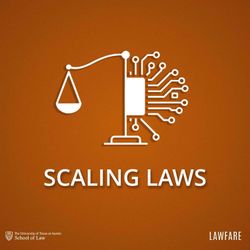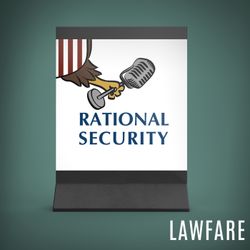Share

The Lawfare Podcast
Chatter: 1876, Election Security, and National Security, with Rachel Shelden
Rachel Shelden is Associate Professor of History and Director of the Richards Civil War Center at Penn State University. She joined David Priess to talk about the disputed presidential election of 1876 and how the political system found a way to avoid widespread violence and another civil war while resolving it in 1877. They discussed Abraham Lincoln's huge impact on kids growing up in Illinois, the status of Reconstruction by 1876, US political culture in the late 19th century, Rutherford Hayes and Samuel Tilden, what happened on election day and night, how Congress handled contradictory election returns from three states, the creation and operation of the special commission created to resolve the issue, how Hayes won, what we can take away from 1876-77, and the importance of Constitutional creativity and flexibility.
Works mentioned in this episode:
"Americans worry about 2020 being another 2000, but the real worry is another 1876," by Rachel Shelden and Erik B. Alexander, Washington Post, October 20, 2000.
Washington Brotherhood by Rachel Shelden (2013)
Chatter is a production of Lawfare and Goat Rodeo. This episode was produced and edited by Cara Shillenn of Goat Rodeo. Podcast theme by David Priess, featuring music created using Groovepad.
More episodes
View all episodes

Lawfare Archive: Are the Courts Ready for a Trump Presidency?
48:22|From February 13, 2025: Only a few weeks have passed since inauguration, but President Trump's barrage of executive orders has already generated dozens of legal challenges. Which raises the question: are the courts up to the job? Executive Editor Natalie Orpett sat down with Benjamin Wittes, Lawfare's Editor-in-Chief, to discuss his recent article, “Are the Courts Up to the Situation?,” published in Lawfare earlier this week. They talked about the courts' role in the face of unprecedented assertions of executive power, how they're faring so far, and what comes next.To receive ad-free podcasts, become a Lawfare Material Supporter at www.patreon.com/lawfare. You can also support Lawfare by making a one-time donation at https://givebutter.com/lawfare-institute.
Scaling Laws: Claude's Constitution, with Amanda Askell
48:28|Alan Rozenshtein, research director at Lawfare, and Kevin Frazier, senior editor at Lawfare, speak with Amanda Askell, head of personality alignment at Anthropic, about Claude's Constitution, a 20,000-word document that describes the values, character, and ethical framework of Anthropic's flagship AI model and plays a direct role in its training.The conversation covers how the constitution is used during supervised learning and reinforcement learning to shape Claude's behavior; analogies to constitutional law, including fidelity to text, the potential for a body of "case law," and the principal hierarchy of Anthropic, operators, and users; the decision to ground the constitution in virtue ethics and practical judgment rather than rigid rules; the document's treatment of Claude's potential moral patienthood and the question of AI personhood; whether the constitution's values are too Western and culturally specific; the tension between Anthropic's commercial incentives and its stated mission; and whether the constitutional approach can generalize to specialized domains like cybersecurity and military applications.Find Scaling Laws on the Lawfare website, and subscribe to never miss an episode.To receive ad-free podcasts, become a Lawfare Material Supporter at www.patreon.com/lawfare. You can also support Lawfare by making a one-time donation at https://givebutter.com/lawfare-institute.
Rational Security: The “Sects, Lies, and Twin Peaks” Edition
01:17:12|This week, Scott sat down with his foreign-policy-minded colleagues Daniel Byman, Michael Feinberg, and Ari Tabatabai to talk through some recent big news stories around the world, including:“Beer Hall Push-back.” Over the weekend, a raft of bipartisan U.S. and European officials headed to Bavaria for the annual Munich Security Conference. Last year, Vice President J.D. Vance gave a barnburner of a speech, accusing European allies of restraining free speech and giving succor to the European far right. This year, Secretary of State Marco Rubio gave a more conciliatory set of remarks that nonetheless signaled that there were some fundamental changes happening in the relationship. For their part, European leaders mostly seemed to be on board with that as they increasingly leaned into the public stance that it was time for the continent to stand on its own, independent of the United States, although how feasible that will be and on what timeline remain the big questions. What should we make of the different remarks we heard from the conference and the broader messages the two sides are sending to each other? And is this a sign of an impending divorce or a different sort of shift in the U.S.-European transatlantic relationship? “Rial Talk.” American and Iranian officials met again this week in Geneva to negotiate an end to the Islamic Republic’s nuclear weapons program in exchange for an easing or elimination of U.S. sanctions on Iran. The negotiations took place amidst continued saber rattling by both President Trump and Iranian Supreme Leader Ali Khamenei, who threatened in a speech ahead of the talks to sink U.S. warships in the region if Iran came under attack. Nonetheless, some participants in the negotiations—particularly the mediators from Oman—seemed optimistic that the two sides were getting closer to some sort of common understanding about how they might move forward. But U.S. military assets are continuing to accumulate in the region, leading some to conclude that a military operation may yet be on the horizon. Is there space for a deal? Or iare we going to see another war in Iran?“Xi Who Must Not Be Named.” A year in, the second Trump administration has not proven to be the China hawk that many expected. Far from drawing a hard line on all things China as the first Trump administration often seemed to do, U.S. officials have instead been surprisingly quiet and conciliatory in regard to China, at least outside the trade context. This has remained true even as reports have emerged of Xi Jinping purging his military of non-loyalists, modernizing China’s nuclear arsenal, and building more submarines—all steps with the potential to significantly upset the balance of power in Asia and beyond. What is the real logic underlying the Trump administration's seemingly quixotic approach to China, and where might it lead the broader relationship between the two major powers? In object lessons, Dan is delighting in John Company, a social-climbing, backroom-dealing, hostile-bargaining board game to, you know, escape the harsh realities of the real world. Ari enthusiastically recommends the Broadway adaptation of Death Becomes Her, which somehow manages to be even quirkier than the original film. Scott has been sucked into the social media abyss by Jess and Quinn’s corny, absurdist, and pun-oriented humor. And Mike offers an anti-object-lesson warning: the “Poetry for Kids” series is not, in fact, reliably for kids.To receive ad-free podcasts, become a Lawfare Material Supporter at www.patreon.com/lawfare. You can also support Lawfare by making a one-time donation at https://givebutter.com/lawfare-institute.
Lawfare Daily: Challenging Immigration Detentions in Minnesota
47:36|The dramatic influx of immigration enforcement actions in Minnesota have landed an enormous number of people in detention. It's led to an unprecedented number of petitions for habeas corpus—that is, people arguing that their detention is unlawful.On today's podcast, Lawfare's Executive Editor Natalie Orpett talked with John Albanese, an attorney at the law firm Berger Montague in Minneapolis, who represents people who are bringing these challenges. They talked about what the flood of habeas petitions actually looks like on the ground—what detention authorities the government is claiming, how the legal community is coming together to address the needs of people in detention, how government lawyers are faring, and how the judiciary is dealing with it all.To receive ad-free podcasts, become a Lawfare Material Supporter at www.patreon.com/lawfare. You can also support Lawfare by making a one-time donation at https://givebutter.com/lawfare-institute.
Lawfare Daily: National Security Regulation of Technology and Data Transactions
54:07|Lawfare Book Review Editor Jonathan Cedarbaum sits down with Justin Sherman, the CEO of Global Cyber Strategies, to discuss his new book, "Navigating Technology and National Security: The Intersection of CFIUS, Team Telecom, AI Controls, and Other Regulations," in which Sherman describes and assesses the proliferation of U.S. regulatory programs designed to guard against national security risks arising from transactions involving technology and data.To receive ad-free podcasts, become a Lawfare Material Supporter at www.patreon.com/lawfare. You can also support Lawfare by making a one-time donation at https://givebutter.com/lawfare-institute.
Lawfare Daily: Ukraine After Year One of Trump’s Second Term, with Eric Ciaramella and Francis Farrell
01:06:20|Eric Ciaramella of the Carnegie Endowment for International Peace and Francis Farrell, a reporter at the Kyiv Independent who covers military and security dynamics in Ukraine, join Lawfare’s Ukraine Fellow Anastasiia Lapatina for a look back at the first year of the Trump presidency through the lens of the war Ukraine. The three delve into the expectations surrounding the Trump administration's approach to Ukraine, the evolving battlefield situation, and the dynamics of U.S. aid. They also analyze the role of Europe in supporting Ukraine, the potential future scenarios for both Ukraine and Russia as they navigate the complexities of the ongoing war, and whether the ongoing peace talks have any chance of succeeding.To receive ad-free podcasts, become a Lawfare Material Supporter at www.patreon.com/lawfare. You can also support Lawfare by making a one-time donation at https://givebutter.com/lawfare-institute.
Lawfare Daily: The Trials of the Trump Administration, Feb. 13
01:42:04|In a live conversation on YouTube, Lawfare Editor in Chief Benjamin Wittes sat down with Lawfare Senior Editors Eric Columbus, Roger Parloff, and Anna Bower, Lawfare Public Service Fellow Troy Edwards, and Lawfare Student Contributor Peyton Baker to discuss the arraignment of Don Lemon and his co-defendants in Minnesota, affidavits released for the FBI search of Fulton County, the Justice Department’s attempt to wipe out Steve Bannon’s conviction, and more.You can find information on legal challenges to Trump administration actions here. And check out Lawfare’s new homepage on the litigation, new Bluesky account, and new WITOAD merch.To receive ad-free podcasts, become a Lawfare Material Supporter at www.patreon.com/lawfare. You can also support Lawfare by making a one-time donation at https://givebutter.com/lawfare-institute.
Lawfare Archive: Jack Goldsmith on Trump v. United States and Executive Power
53:00|From February 12, 2025: Jack Goldsmith, the Learned Hand Professor at Harvard Law School and co-founder of Lawfare, joins Alan Rozenshtein, Associate Professor of Law at the University of Minnesota and Senior Editor at Lawfare, to talk about his recent Lawfare article discussing last year's Supreme Court decision in Trump v. United States and its implications for executive power. They discuss how the ruling extends beyond presidential immunity, the broader shift toward a maximalist theory of executive authority, and what this means for the future of American democracy.To receive ad-free podcasts, become a Lawfare Material Supporter at www.patreon.com/lawfare. You can also support Lawfare by making a one-time donation at https://givebutter.com/lawfare-institute.
Lawfare Archive: Nayna Gupta on the Laken Riley Act
34:48|From February 7, 2025: On today’s podcast, Lawfare Associate Editor for Communications Anna Hickey spoke to Nayna Gupta, Director of Policy at the American Immigration Council, about the Laken Riley Act, the first piece of legislation signed by President Trump in his second term, its start as a messaging bill in the last Congress, and its impact on the immigration detention system.To receive ad-free podcasts, become a Lawfare Material Supporter at www.patreon.com/lawfare. You can also support Lawfare by making a one-time donation at https://givebutter.com/lawfare-institute.